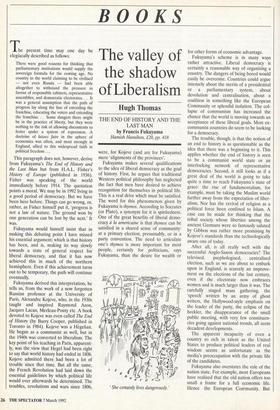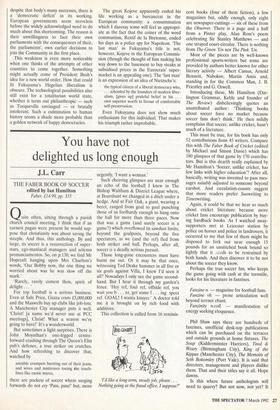BOOKS
The valley of the shadow of Liberalism
Hugh Thomas
THE END OF HISTORY AND THE LAST MAN by Francis Fukuyama Hamish Hamilton, £20, pp. 418 he present time may one day be elegiacally described as follows: There were good reasons for thinking that parliamentary institutions would supply the sovereign formula for the coming age. No country in the world claiming to be civilised — not even Russia — had been able altogether to withstand the pressure in favour of responsible cabinets, representative assemblies, and democratic electorates. . . It was a general assumption that the path of progress lay along the line of extending the franchise, educating the voters and extending the franchise. . . Some dangers there might be in the practice of liberty, but they were nothing to the risk of allowing discontents to fester tinder a system of repression. A doctrine of laissez faire in the sphere of economics was often, and most strongly in England, allied to this widespread faith in political freedom ...
This paragraph does not, however, derive from Fukuyama's The End of History and the Last Man but from H.A.L. Fisher's History of Europe (published in 1936). Fisher was speaking of the world immediately before 1914. The quotation points a moral. We may be in 1992 living in a good period of democracy. But we have been here before. Things can go wrong, or, rather, as Fisher himself put it, 'progress is not a law of nature. The ground won by one generation can be lost by the next.' It was.
Fukuyama would himself insist that in making this debating point I have missed his essential argument; which is that history has been, and is, making its way slowly towards a state of general respect for liberal democracy, and that it has now achieved this in much of the northern hemisphere. Even if this achievement turns out to be temporary, the path will continue eventually.
, Fukuyama derived this interpretation, he tells us, from the work of a now forgotten Russian professor at the University of Paris, Alexandre Kojeve, who, in the 1930s taught and inspired Raymond Aron, Jacques Lacan, Merleau-Ponty etc. A book devoted to Kojeve was even called The End of History (by Barry Cooper, published in Toronto in 1984). Kojeve was a Hegelian. He began as a communist as well, but in the 1940s was converted to liberalism. The key point of his teaching in Paris, apparent- ly, was the view that Hegel had been right to say that world history had ended in 1806. Kojeve admitted there had been a lot of trouble since that time. But all the same, the French Revolution had laid down the essential guidelines by which political life would ever afterwards be determined. The troubles, revolutions and wars since 1806,
were, for Kojeve (and are for Fukuyama) mere 'alignments of the provinces'.
Fukuyama makes several qualifications to the idea of liberal democracy as the goal of history. First, he argues that traditional Western political philosophy has neglected the fact that men have desired to achieve recognition for themselves in political life. This is a real drive which must be satisfied. The word for this phenomenon given by Fukuyama is thymos. According to Socrates (or Plato), a synonym for it is spiritedness. One of the great benefits of liberal demo- cracy et la americaine is that thymos can be satisfied in a shared sense of community: at a primary election, presumably, or in a party convention. The need to articulate one's thymos is more important for most people, certainly for politicians, says Fukuyama, than the desire for wealth or 'She certainly lives dangerously.' for other forms of economic advantage.
Fukuyama's scheme is in many ways rather attractive. Liberal democracy is certainly a reasonable way of organising a country. The dangers of being bored would easily be overcome. Countries could argue intensely about the merits of a presidential or a parliamentary system, about devolution and centralisation, about a coalition in something like the European Community or splendid isolation. The col- lapse of communism has increased the chance that the world is moving towards an acceptance of these liberal goals. Most ex- communist countries do seem to be looking for a democracy.
The trouble, though, is that the notion of an end to history is as questionable as the idea that there was a beginning to it. This applies whether the end of history is seen to be a communist world state or an interlocking network of representative democracies. Second, it still looks as if a great deal of the world is going to take quite a time to reach Fukuyama's state of grace: the rise of fundamentalism, for example, must be taking the Muslim world further away from the expectation of liber- alism. Nor has the revival of religion as a political force been confined to Islam. A case can be made for thinking that the tribal society whose liberties among the ancient Germans were so famously saluted by Gibbon was rather more promising by Kojeve's standards than the technologically aware one of today.
After all, is all really well with the successful Anglo-Saxon democracies? The televised, psephologised, centralised election, such as we are about to embark upon in England, is scarcely an improve- ment on the elections of the last century, even if the electorate now embraces women and is much larger than it was. The carefully staged mass gathering, the 'speech' written by an army of ghost writers, the Hollywood-style emphasis on the leader of the party, the eclipse of the heckler, the disappearance of the small public meeting, with very few constituen- cies going against national trends, all seem decadent developments.
The apparent incapacity of even a country so rich in talent as the United States to produce political leaders of real wisdom seems as unfortunate as the media's preoccupation with the private life of the candidates.
Fukuyama also overstates the role of the nation state. For example, most Europeans have realised that the old nation offers too small a frame for a full economic life. Hence the European Community. But despite that body's many successes, there is a 'democratic deficit' in its working. European governments seem nerveless before the widely acknowledged need to do much about this shortcoming. The reason is their unwillingness to face their own parliaments with the consequences of their, the parliaments', own earlier decisions to join the Community in the first place.
This weakness is even more noticeable when one thinks of the attempts of other countries to come together. Something might actually come of President Bush's idea for a new world order. How that could fit Fukuyama's Hegelian liberalism is obscure. The technological possibilities also still exist for a totalitarian world state, whether it turns out philanthropic — such as Tocqueville envisaged — or brutally intolerant. Such a culmination to human history seems a shade more probable than a golden network of happy democracies. The great Kojeve apparently ended his life working as a bureaucrat in the European community: a consummation which I daresay some will feel as appropri- ate as the fact that the coiner of the word communism, Restif de la Bretonne, ended his days as a police spy for Napoleon. 'The last man' in Fukuyama's title is not, however, Kojeve in the European Commis- sion (though the thought of him making his way down to the basement to buy steaks at subsidised prices in the Eurocrats' super- market is an appealing one). The 'last man' is an expression of an idea of Nietzsche's:
the typical citizen of a liberal democracy who, ... schooled by the founders of modern liber- alism, [gives up] prideful belief in his . own superior worth in favour of comfortable self-preservation.
Even Fukuyama does not show much enthusiasm for this individual. That makes his triumph rather improbable.



















































 Previous page
Previous page